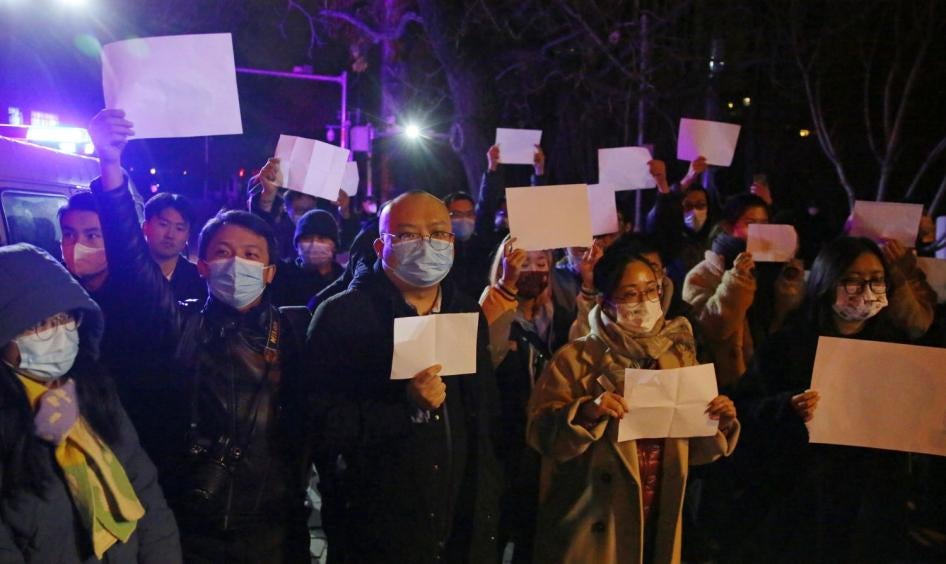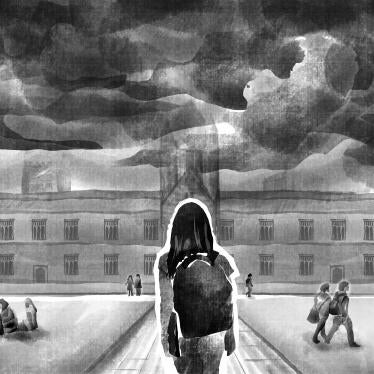(Jakarta) – People across China took to the streets in late 2022 to peacefully protest the government’s draconian Covid-19 restrictions and to call for freedom and human rights, Human Rights Watch said today in its World Report 2023.
President Xi Jinping consolidated his power by securing an unprecedented third term in October as the leader of the ruling Chinese Communist Party. Throughout the year, Chinese authorities repeatedly imposed unpredictable lockdowns on hundreds of millions of people under the “zero-Covid” policy, impeding people’s access to health care, food, and other necessities.
“People across China took extraordinary risks to publicly demonstrate for their human rights,” said Sophie Richardson, China director at Human Rights Watch. “Governments around the world should support people’s rights to free speech and peaceful protest, and hold the Chinese government accountable for rights abuses committed at home and abroad.”
In the 712-page World Report 2023, its 33rd edition, Human Rights Watch reviews human rights practices in close to 100 countries. In her introductory essay, acting Executive Director Tirana Hassan says that in a world in which power has shifted, it is no longer possible to rely on a small group of mostly Global North governments to defend human rights. The world’s mobilization around Russia’s war in Ukraine reminds us of the extraordinary potential when governments realize their human rights obligations on a global scale. The responsibility is on individual countries, big and small, to apply a human rights framework to their policies, and then work together to protect and promote human rights.
Throughout the year the Chinese government continued its disproportionate and draconian Covid-19 restrictions, subjecting people across the country to abrupt, prolonged lockdowns. Numerous people reported difficulties getting food and medical care, in some cases resulting in deaths. There were also widespread reports of vulnerable populations lacking access to food, medicine, and other necessities. Online videos showed police and Covid-19 control workers beating and dragging people who resisted Covid-19 restrictions.
Demonstrators inside and outside China protested against the Chinese government’s Covid-19 abuses, economic hardships, censorship, and President Xi’s expanded power. In October in Beijing, a man draped two banners over a bridge, calling for the end of Xi’s rule. In November, hundreds of residents in Guangzhou took to the street and tore down barriers in defiance of abusive lockdown orders. A fire at an apartment building under lockdown in Xinjiang where at least 10 people died triggered the protests in Shanghai, Beijing, and many other cities that began in November.
The Chinese government appointed an abusive former police official, John Lee, as Hong Kong’s chief executive. The authorities baselessly charged journalists with sedition and arrested peaceful protesters for allegedly violating the draconian National Security Law. Many in Hong Kong continued to commemorate the 1989 Tiananmen Massacre and publicly sang the banned protest song “Glory to Hong Kong.”
The government imposed deepening repression on Tibetans, including with an expansive campaign to forcibly collect DNA samples. In March, a Tibetan singer, Tsewang Norbu, immolated himself in protest.
In June, the United States Uyghur Forced Labor Prevention Act went into effect, establishing a presumption that goods from Xinjiang are made from forced labor and cannot be imported. In August, the then United Nations high commissioner for human rights released her report on Xinjiang, concluding that the abuses in the region “may constitute crimes against humanity.”
International pressure on the Chinese government over human rights violations intensified. Eight governments engaged in a diplomatic boycott of the 2022 Beijing Winter Olympics. The European Union introduced draft legislation to establish global standards for human rights due diligence for companies, prompted in part by abuses in Xinjiang.
Beijing’s failure to condemn Russia’s war crimes in Ukraine, Chinese diplomats’ attacks on United Nations human rights bodies, and Chinese consulate officials’ physical assault on a Hong Kong pro-democracy protester in the UK prompted widespread censure by governments.









